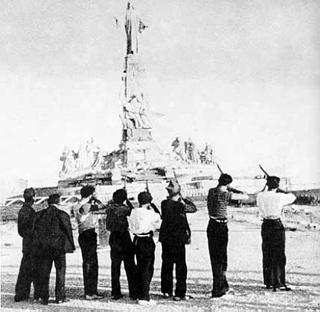Can we start again?
I think a central reason for the rise of secularism generally is wishy-washy Christianity, one main form of which I’ll name Francoism.
Francoism is Christianity with all the good stuff removed, a dry dusty belief that fights modernity with literalism, where things were better in the old days, nit-picking about what is sinful, sitting in serried ranks to keep up appearances, follow orders or burn in hell. At its extreme, a Christianity without Christ. I name this pointless ship Francoism because I think his dead, conformist, bureaucratic regime did much to add to the genre and bring it onto the streets.
Given the freedom to choose, if the only options were Francoism or atheism, I’d gladly choose the latter and have done with the whole sorry business.All branches of Christianity have suffered from Francoism,
I understand what you’re saying, but it depends on some assumptions that are not proved and seem pretty questionable to me.
There is no particular reason to believe that Franco affected anyone’s religion during his rule. Obviously, Spain, right before the Civil War, was much affected by the false promises of communism and the murderous licentiousness which communism tended to engender wherever it took power. It is very interesting to read Solzhenitsyn’s analysis of the psychology of it, and the moral corruption which it both forces and rewards. France, during the same prewar period, was much affected by it as well. It could be argued and has been ably argued that France’s defeat at Hitler’s hands was enabled by French communists and related socialists, who were following the Soviet line during the “non aggression pact” period, and that their turnaround, after Hitler invaded the Soviet Union, was too late. Should religious belief have prevented that corruption of values? Certainly. But I think it’s a big stretch to attribute any of that to Franco or a broadly defined “Francoism”. Those Frenchmen who advised not angering Hitler at the orders of Stalin were not motivated by religion, “dead” or otherwise, but by secular materialism and its false gods.
There is actually no particular reason that I have ever seen persuasively argued, to think those who, in Spain, were not infected by bolshevism, were any less or more truly fervent or believing than were their forbears. Undoubtedly there were opportunists and even psychopaths among the supporters of Franco. But then, what were the Republicans who raped and executed nuns? I have not seen a case made that Franco himself wasn’t every bit as fervent a believer as was, say, Oliver Cromwell, however misguided either of them might be deemed to have been.
Undoubtedly there were ordinary people in the Republican ranks; people of good intent and people of genuine religious faith. But their leaders were not of that sort.
Your description of what you term “Francoism” could rightly be applied to many churchgoing people of all denominations today, and probably could have been rightly applied to many in every century before and after Christ. But I don’t think it has a whole lot to do with Franco, when we see it everywhere.
It really does seem to me that the enemy of genuine religion today is secular materialism. Certainly that has origins in philosophical constructs such as the Enlightenment, Marxism and the Existentialist philosophers of the early 20th Century. Even to (of all people) Hugh Hefner. I think attributing that development to Franco or to some aspect peculiar to him, attributes far too much to him and ignores the directions from which the real dangers come.
Russia, before 1917, was known as a place of real religious faith, and probably was. The secular materialism of bolshevism intervened and now perhaps as few of 10-15% of the population of Russia is observant. Franco or even “Francoism” as you describe it, had nothing to do with that. Persecution and the gradual corruption of a people through secular materialist inculcation and motivations, did. Solzhenitsyn’s “Gulag” trilogy can be a tough slog, but I highly recommend it to anyone who is interested in the process by which a whole people can become corrupted. Interestingly, the only people whom he really admires generally are the Poles, Western Ukrainians and Lithuanians, whose religious practices then would presently seem “restrictive” to many, but who were uniquely able to resist the corrupting influences of bolshevism under the most horrific of circumstances.
If one looks at the U.S. itself, there is much reason for concern. Abortion on demand is now part of the national fabric. We have a president who, in effect, endorsed infanticide for those whose attempted abortions did not succeed. We have a congress that is on the cusp of officially endorsing overt homosexuality in the military. We have rulers and a people who, at least potentially, have felt it appropriate to vote themselves benefits at the expense of those who come after us. We have a nation that is constricted by a “political correctness” so bizarre that it’s deemed acceptable to portray Jesus as a homosexual but not acceptable to portray Mohammed at all. We have an economy that was brought down by widespread fraud, and from which our representatives seem paralyzed to correct it. Franco’s regime might have been constricting and hidebound in its ways, but I maintain that, at this juncture, we in the U.S. are very little distance removed from something very similar, though less simple and less overt. And nobody got any of that from Franco or from practices like those he imposed.
But none of that says anything useful about the faith of individuals.
Politically, we can at least hope for better things, though they will be very difficult. We can hope for similar things in the churches as well. We should hope for the latter before the former.
(continued)

